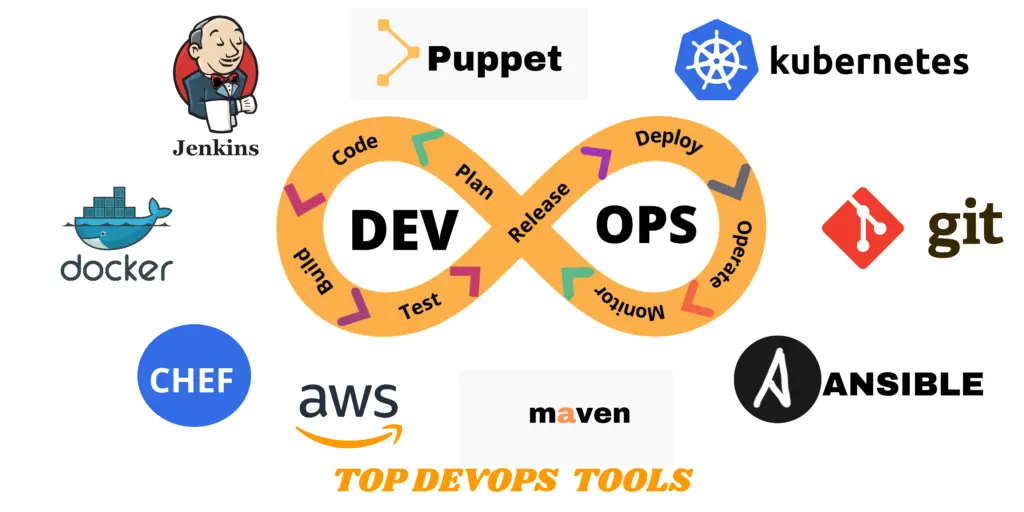Best DevOps Tools & Technologies for a Successful Transition in 2022

DevOps has taken the world by storm in recent years, but the truth is that it’s hard to succeed at the DevOps culture without the right tools and technologies on your side. This list of DevOps tools will ensure you have all the right items in place to ensure your company has the smoothest transition possible into DevOps, increasing speed and efficiency while decreasing cost and risk of failure.
Docker – A Containerization Tool

Docker is an open source tool that allows developers to create, deploy and run applications within containers. Docker helps developers manage multiple versions of libraries and dependencies while allowing them to seamlessly run projects on different platforms. Docker can also be used to create virtual machines. Popular project management tools like Jenkins are built with Docker, making it easy to build environments needed for continuous integration and delivery.
Ansible – A Configuration Management Tool

Ansible has made it to our top 10 DevOps tools and technologies. Ansible is an open source, simple configuration management tool that makes IT automation easy and is used by thousands of organizations around the world. Learn more about Ansible here .
Kubernetes – A Container Cluster Tool

While most of today’s data is being generated by human activities, it will soon be overtaken by artificial intelligence (AI). This phenomenon is commonly referred to as the AI explosion. Inevitably, companies will need to incorporate AI into their applications. There are multiple ways to do so; however, Kubernetes offers significant benefits over competing solutions. Among these are flexibility and speed. The open-source platform can easily adapt to changing customer requirements. It also uses container technology, which makes application deployment faster than traditional methods.
Jenkins – A CI/CD System

Jenkins is an open source continuous integration (CI) and continuous delivery (CD) server. It offers more than 400 plugins to support building, deploying, and automating any project. CI/CD is aimed at automating your software development life cycle, which enables you to create new projects faster while using common procedures to test, release, and monitor them.
Docker Cloud – Software as a Service Platform

An open platform to manage containers across multiple hosts, that features enterprise-grade security, networking and automation. Elimites the need to install and maintain virtual infrastructure. Version Control Tool: Github is an open source code hosting platform that offers advanced version control capabilities like Git along with other advanced features of collaboration and code management. Monitoring and error reporting platforms: Splunk is a software company focused on delivering IT Operational Intelligence to business organizations of all sizes.
Build Tool: Maven

Maven is an open source software project management and comprehension tool. Maven can be thought of as a build automation tool but is generally used to describe its ability to manage dependencies through its repository manager, although it has other uses. It also allows users to build projects with various tools, such as Apache Ant and Apache Maven Web Site (or Apache Tomcat) without having to write a build script.
Configuration Management Tool: Puppet

Puppet is an open source configuration management software platform. Its goal is to allow system administrators to describe how their machines should be configured, and then, once they are configured, verify that they are indeed so. Puppet can work with operating systems including GNU/Linux and OS X; it can also work with applications such as Apache HTTP Server and PostgreSQL.
AWS Cloud Computing and Storage in DevOps

The Amazon Web Services (AWS) cloud computing platform offers many features specifically designed to help customers increase their productivity and provide more value to customers—such as faster deployments and automation. DevOps, on the other hand, represents an organization’s ability to continuously deliver high-quality products or services through continuous integration, continuous testing, and continuous delivery. To understand how these concepts fit together, let’s take a look at how AWS can help you create a successful DevOps strategy.
Azure Cloud Computing and Storage in DevOps

Microsoft Azure Cloud Computing and Storage services has become an essential component of any successful DevOps deployment. Running your own data center can be expensive, and leaves you vulnerable to unscheduled outages. If you’re willing to forego control over your hardware, Microsoft Azure can provide cost-effective solutions with almost complete uptime, as well as other advantages that are hard to find elsewhere.
